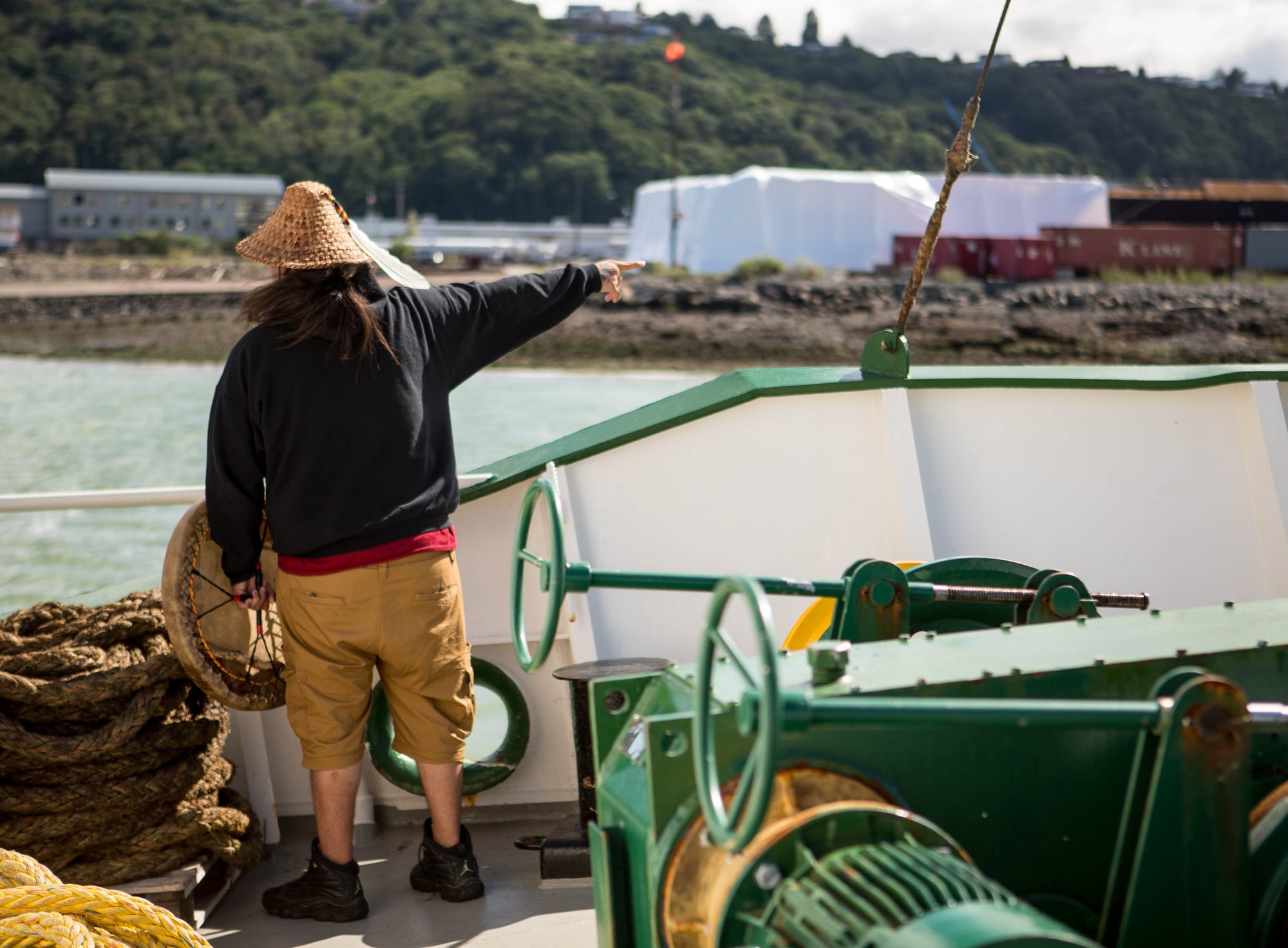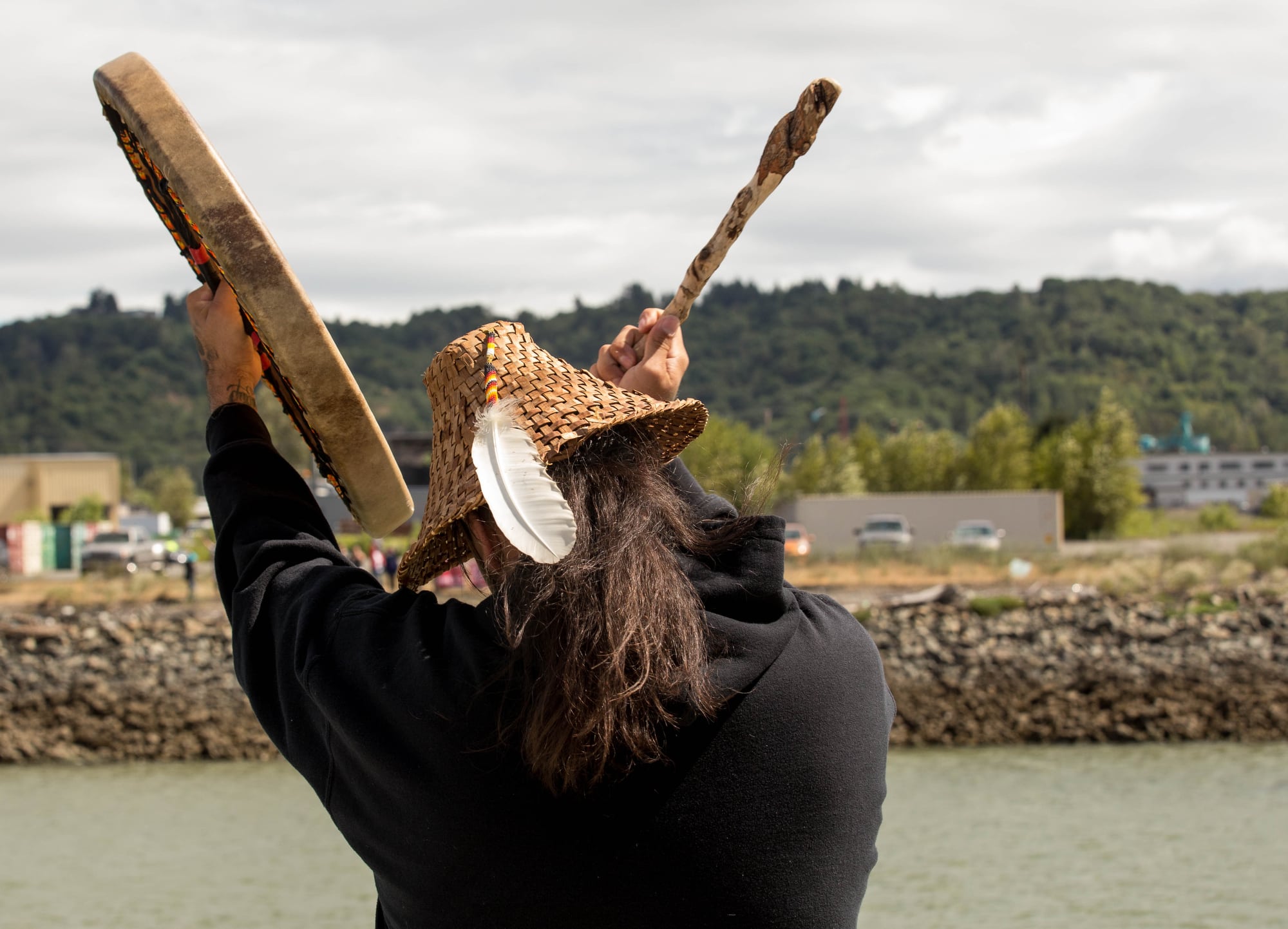Joining Greenpeace on board the Arctic Sunrise, Dakota Case has been a life-long activist, now fighting against a grave risk to his home, the water, and his tribe’s way of life.

The Greenpeace Arctic Sunrise, sails the Salish Sea off the Washington coast near Seattle, Tacoma, Bellingham, and the San Juan Island. The ship is following the route that would experience a seven-fold increase in tar sands tanker oil traffic if the pipeline expansion is completed. The report documents the communities threatened by the Trans Mountain Expansion Project, which would worsen the effects of global warming, risk poisoning water, jeopardize the hundreds of thousands of jobs that depend on clean coasts, violate Indigenous sovereignty, and threaten the extinction of the Southern Resident Orca Whale, of which only 75 remain.
Dakota Case is from an urban tribe. This is not by choice, but because the city of Tacoma, Washington was built in and around the home of his ancestors — the Puyallup Nation. Dakota, raised by life-long activists, has been protecting the Salish Sea his whole life and the region is deeply connected to who he is. Joining Greenpeace on board the Arctic Sunrise, Dakota has been raising awareness around the construction of the Liquified Natural Gas Plant (LNG) in the Port of Tacoma, and the proposed Trans Mountain pipeline expansion project — both presenting a grave risk to his home, the water, and his tribe’s way of life.
The Arctic Sunrise has been following the route of tar sands tanker and barge traffic from the Trans Mountain pipeline as part of the work to stop pipelines for good. Some of this traffic goes to the U.S. Oil refinery in Tacoma, Washington. Dakota describes why he is fighting the intrusion of fossil fuels in his home, and what is at stake for the future of the region.
Lauren Reid: Can you tell us a little bit about who you are and why you are here on the Arctic Sunrise?
Dakota Case: My name is Dakota Case and I am a Puyallup Water Warrior. I am on the Arctic Sunrise today to raise awareness on the NoLNG253 campaign. I was born on our land in Tacoma, on the Puyallup Territory. I am also here today to stand in solidarity with Greenpeace as they work on the Kinder Morgan pipeline campaign because it affects our community because the tar sands come straight from our land. I think we all have the same goal of a sustainable world for future generations.
For more information on the NoLNG253 Campaign, head here.

Dakota Wayne Case, Puyallup Tribe of Indians, points out where the liquified natural gas facility is proposed to be built in Tacoma. The Greenpeace Arctic Sunrise sails the Salish Sea off the Washington coast near Seattle, Tacoma, Bellingham, and the San Juan Island. The ship is following the route that would experience a seven-fold increase in tar sands tanker oil traffic if the pipeline expansion is completed.
LR: You are a new skipper for the Puyallup Tribe. How does a canoe journey shed light on the Trans Mountain Pipeline Expansion and the LNG Facility?
DC: Honestly it connects all the pieces to the puzzle — the Lummi and Swinomish territories all came together with this. We have a protocol where each tribe shows their weakest side when they come forward to ask leaders and elders to come on shore. It’s a way to show that you come peacefully. So together this journey is called “Honor the Medicine”, and each tribe will bring medicine from their own territories and dump them into the waterway in front of the LNG facility. Afterward, they’ll tell their own story of what they dumped and why, and the significance of this medicine to their people. The LNG facility is a threat to our way of life, and a threat to the salmon here. It’s part of our creation story that when our creator blew life into us, the creator gave an option to go to the water or stay on land — water became the salmon people, the Coast Salish people, and in that moment of splitting, we and made a sacred promise to always protect the salmon and they would always come and nourish us.
LR: There is a refinery that takes tar sands to your territory. What do you see at stake for your community if this tanker superhighway comes to fruition?
DC: It would be a devastation. We’re already one of the most polluted ports in the United States.
LR: Can you describe what these barges and tankers are like?
DC: They anchor the barge right off the point where were start our canoe journey, and we regularly go by it in a canoe. It’s one of the ugliest things you can imagine. They look like big empty ships but the tar sands are stored below deck. The Port of Tacoma has one of the nastiest stenches too. We protested in the port for 2 weeks straight, and it took our bodies almost a month to come back to normal — we had to detox from it. It messes with my head sometimes too, because I think about the future for my kids. My sons will have to go to war for water, they don’t know what it’s like to not breathe dirty air. I don’t know how this is sustainable for future generations.

Dakota Wayne Case, Puyallup Tribe of Indians, on board the Arctic Sunrise as the ship displays a banner message near the US Oil facility in Tacoma.
LR: How did you come to be involved with the Water Warriors? What was the path you’ve taken to protect the Salish Sea?
DC: I was raised this way. I am a 4th generation of the American Indian Movement, and Janet McCloud was my great-grandmother and a founding member of this movement. She inspired me a lot. She was named the woman of the year in the Pacific Northwest, and was known as “the only woman who could hold the community in her hands.” I feel like I’m honoring her by passing on her teachings and lessons. So with the Water Warriors Movement, and being a founding member of the Water Warriors council, we found it necessary to come together as a group of tribal members to protect our environment and to awaken our people from Tacoma to the injustice that’s upon us.
As a founding member of the Puyallup Water Warriors — Dakota will be a skipper in a month-long canoe journey to honor his ancestors and way of life, traveling their highways in the Salish Sea, from the Lower Elwha to Tacoma — singing, telling stories, and protecting his Nation’s way of life against the unending intrusion of fossil fuels in his home. Follow and support their work!
